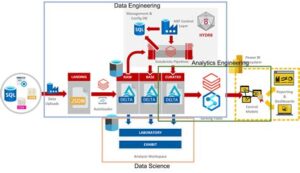Explore the essentials of Industrial Systems Engineering, including process optimization, key components, and innovative solutions for enhanced efficiency. Welcome to the world of Industrial Systems Engineering, where innovation meets efficiency to transform complex processes into streamlined operations. As industries continually evolve, understanding the fundamentals of this field becomes essential for organizations seeking to enhance productivity and drive growth. This article will delve into the core principles of industrial systems engineering, exploring how it plays a pivotal role in optimizing workflows and boosting operational effectiveness. We will examine the critical components involved in input development, highlight result-oriented strategies in systems management, and showcase innovative solutions designed to enhance efficiency. Whether you are an industry professional or simply curious about the transformative power of industrial systems, this guide will equip you with the knowledge to navigate this dynamic landscape successfully. Join us as we unpack the essentials and practical applications of industrial systems engineering.
Understanding The Basics Of Industrial Systems Engineering
Industrial systems engineering is a multifaceted discipline that blends various fields of engineering and management principles to optimize complex systems. It is fundamentally concerned with the efficient integration of people, materials, information, and energy into a cohesive operational framework. This discipline enhances productivity by systematically evaluating processes and implementing improvements.
At its core, industrial systems engineering focuses on three primary elements: systems design, operations, and management. These elements work together to create an efficient workflow, minimize waste, and increase overall productivity. To achieve this, industrial systems engineers utilize a combination of mathematical models, statistical analysis, and computer simulations.
| Core Elements | Functions |
|---|---|
| Systems Design | Creating and configuring systems that improve performance and efficiency. |
| Operations | Monitoring and managing day-to-day activities to ensure smooth functionality. |
| Management | Strategizing and implementing policies to enhance organizational performance. |
Moreover, industrial systems engineering emphasizes the importance of data analysis for informed decision-making. Engineers in this field often employ predictive analytics to foresee potential issues and address them proactively, ensuring that systems remain agile and responsive to changing demands.
Overall, a solid understanding of industrial systems engineering is crucial for professionals looking to drive operational success and maintain a competitive edge in continuously evolving industries.
The Role Of Industrial Systems In Streamlining Processes
The integration of industrial systems plays a pivotal role in optimizing and streamlining various processes across industries. By focusing on the holistic approach to systems engineering, organizations can identify inefficiencies, reduce waste, and enhance productivity.
One of the core functions of industrial systems is to facilitate the seamless flow of information and materials within a business. This interconnectedness enables teams to collaborate more effectively, ensuring that every department is aligned with the organization’s overall goals. As a result, decision-making processes become quicker and more informed, leading to improved responsiveness to market demands.
Moreover, industrial systems employ advanced methodologies, such as Lean manufacturing and Six Sigma, to eliminate redundancies and optimize resource allocation. These techniques focus on value creation, minimizing delays, and ensuring that every step in the production process serves a purpose. By adopting such systematic approaches, businesses can achieve greater consistency in quality and delivery times.
| Benefits of Industrial Systems | Description |
|---|---|
| Increased Efficiency | Streamlined processes reduce bottlenecks, enhancing overall workflow. |
| Cost Reduction | Minimizing waste leads to lower operational costs. |
| Improved Quality Control | Real-time data analysis helps maintain product quality. |
| Enhanced Collaboration | Integrated systems foster better communication across departments. |
In conclusion, the effective application of industrial systems provides organizations with the tools necessary to streamline processes, achieve operational excellence, and ultimately drive success in a competitive market environment. Understanding and implementing these systems can lead to significant improvements in efficiency and productivity, making them an essential component of modern industry.
Input Development: Key Components Of Industrial Systems Engineering
In the realm of industrial systems engineering, input development plays a crucial role in shaping effective processes and ensuring system reliability. The foundational components of input development can be classified into several key areas:
- Data Acquisition: Gathering accurate and relevant data is essential for any industrial system. This can include everything from raw material specifications to production metrics, which must be analyzed to inform decisions.
- Stakeholder Inputs: Involving stakeholders from various realms such as management, operations, and engineering can provide diverse perspectives that enhance the input framework. This collaborative approach leads to well-rounded decision-making.
- System Requirements: Clearly defined system requirements outline the expectations and functionalities of the industrial systems. This ensures alignment between the development team and the end-users’ needs.
- Resource Availability: Assessing the availability of resources, whether they be human, financial, or technological, is crucial so that plans can be tailored according to what is feasible and sustainable.
- Regulatory Compliance: Understanding and integrating industry standards and regulations into the input development process protects organizations from future compliance issues and ensures best practices are followed.
By focusing on these components, organizations can create a robust foundation for their industrial systems, leading to improved productivity and efficiency within their operations.
Result-Oriented Approaches In Industrial Systems Management
In the realm of industrial systems management, adopting a result-oriented approach is crucial for maximizing productivity and ensuring that processes align with organizational goals. This methodology emphasizes the importance of outcomes over mere activities, focusing on measurable results that drive continuous improvement.
To implement effective result-oriented strategies, consider the following key approaches:
| Approach | Description | Impact on Industrial Systems |
|---|---|---|
| Performance Metrics | Establishing clear KPIs to measure progress and efficiency. | Helps in tracking performance, enabling teams to identify areas for improvement. |
| Data-Driven Decision Making | Leveraging analytics and data to inform strategies and operations. | Facilitates informed decisions that can optimize processes and resource allocation. |
| Continuous Improvement (Kaizen) | Encouraging incremental changes to enhance processes continuously. | Promotes a culture of ongoing enhancement, leading to better efficiencies over time. |
| Cross-Functional Collaboration | Involving different departments to integrate efforts and share insights. | Improves overall system functionality and responsiveness to challenges. |
| Stakeholder Engagement | Involving all relevant parties in decision-making processes. | Ensures that systems meet the needs of users and enhances buy-in for changes. |
By integrating these approaches into industrial systems management, organizations can effectively align their resources and processes with strategic objectives, leading to sustained success and improved productivity.
Enhancing Efficiency With Innovative Industrial Systems Solutions
In today’s fast-paced world, businesses seek to improve efficiency and reduce costs. One effective approach is through the adoption of innovative industrial systems solutions. These solutions integrate advanced technology with systematic management practices, which enable organizations to optimize their processes and resource allocation.
Innovative industrial systems encompass various methodologies and tools, such as Lean Manufacturing, Six Sigma, and automation technologies. For instance, Lean Manufacturing focuses on minimizing waste while maximizing value, leading to enhanced productivity. By analyzing workflows and eliminating non-value-added activities, organizations can streamline operations significantly.
Moreover, the integration of automation and data analytics into industrial systems allows companies to gather data in real-time, facilitating better decision-making and proactive problem-solving. Predictive analytics can identify potential issues before they escalate, ultimately preserving operational continuity. As a result, businesses can respond swiftly to market demands and service quality improvements.
Another innovative solution is the implementation of the Internet of Things (IoT) within industrial systems. IoT technologies connect devices and systems to monitor performance remotely. This connectivity provides insights about equipment health, production rates, and energy consumption, allowing organizations to make informed adjustments to their operations and further enhance efficiency.
Ultimately, leveraging innovative industrial systems solutions is essential for organizations aiming to stay competitive. By embracing these strategies and technologies, businesses can not only streamline their processes but also foster a culture of continuous improvement, which is critical in today’s dynamic industrial landscape.
Frequently Asked Questions
What is industrial systems engineering?
Industrial systems engineering is a branch of engineering that focuses on designing, improving, and optimizing complex systems and processes within various industries.
What are the key principles of industrial systems engineering?
The key principles include systems thinking, optimization, resource management, quality control, and continuous improvement.
What industries can benefit from industrial systems engineering?
Industries such as manufacturing, healthcare, logistics, and service sectors can all benefit from industrial systems engineering practices.
What tools do industrial systems engineers use?
They use various tools such as simulation software, statistical analysis, process mapping, operations research, and Lean Six Sigma methodologies.
How does industrial systems engineering contribute to efficiency?
It contributes to efficiency by analyzing workflows, reducing waste, streamlining processes, and implementing improvements that save time and resources.
What skills are important for an industrial systems engineer?
Important skills include analytical thinking, problem-solving, project management, communication, and proficiency in data analysis tools.
What is the future of industrial systems engineering?
The future includes increased integration of technology, automation, and data analytics to optimize systems further, particularly with the advent of Industry 4.0.





